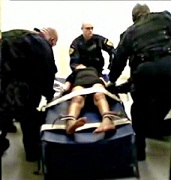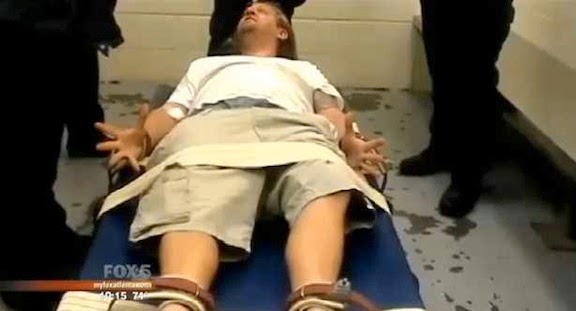The Vampire State Draws Bloodby William Norman GriggJul. 01, 2014 |
Popular 
Report: Blinken Sitting On Staff Recommendations to Sanction Israeli Military Units Linked to Killings or Rapes

America Last: House Bill Provides $26B for Israel, $61B for Ukraine and Zero to Secure U.S. Border

'Woke' Google Fires 28 Employees Who Protested Gaza Genocide

Bari Weiss' Free Speech Martyr Uri Berliner Wants FBI and Police to Spy on Pro-Palestine Activists

John Hagee Cheers Israel-Iran Battle as 'Gog and Magog War,' Will Lobby Congress Not to Deescalate
  Shigeru Mizuki, a historian and manga artist, has described a World War II muster call in which pilots were invited to volunteer for a kamikaze operation. Each was handed two ballots; one of them read “willing,” the other, “very willing.” Those who didn’t “volunteer” would be killed. Shigeru Mizuki, a historian and manga artist, has described a World War II muster call in which pilots were invited to volunteer for a kamikaze operation. Each was handed two ballots; one of them read “willing,” the other, “very willing.” Those who didn’t “volunteer” would be killed.Imperial Japan, of course, was neither the first nor the last despotism to impose this eccentric vision of volunteerism. During the mid-1980s, a state radio broadcast in East Germany proudly announced a record-breaking national blood drive. In the audio equivalent of fine print could be found the critical, defining detail: “Most of the donors were volunteers.” To celebrate what used to be called Independence Day, police in Oregon have announced a “no refusal” initiative for the Fourth of July weekend. Motorists who refuse to “volunteer” for a Breathalyzer test will be subjected to an immediate involuntary blood test, which will take place either at the side of the road, a nearby medical facility, or in a jail. Prosecutors and judges will be on call to rubber-stamp police requests for a blood draw warrant. By treating the right to travel as if it were a state-granted privilege, the Regime and its affiliates created a concept called “Implied Consent.” This amounts to a plenary waiver of individual rights for anybody who receives a state-issued driver’s license. Under “Implied Consent,” police throughout the soyuz – like their East German antecedents – can detain any driver at their discretion, conduct a warrantless search of the driver's vehicle, and compel the driver to undergo a “chemical test” for alcohol, by way of either a Breathalyzer or the more invasive method of a bodily fluid test – blood or urine. Refusal to submit to this procedure will generally lead to summary arrest for “per se intoxication”; furthermore, as one legal advice website warns, “Under implied consent laws, in most states a driver's license is automatically suspended for up to one year, even if the motorist is not found guilty of DUI.” So, in the East German sense of the expression, those of us who have driver's licenses have "volunteered" to be stopped, interrogated, searched, and surrender bodily samples at the whim of a DUI enforcement officer. Under this totalitarian approach, “due process” consists of immediate judicial ratification of a police demand for self-incriminating evidence. The Breathalyzer is a notoriously unreliable technology, and police will readily admit as much – but only when that otherwise infallible device produces test results that exonerate a driver. The threat of an involuntary blood draw is being used to extort compliance with a scientifically invalid testing protocol – which in some cases simply serves as a prelude to even greater violations, including “rape by instrumentality” and torture.  In October 2011, a federal district court for southern Indiana dismissed a lawsuit filed by Jamie Lockard. Mr. Lockard passed a Breathalyzer test but was kidnapped, caged, and subjected to object rape by Officer Brian Miller, who was shielded from accountability by invoking the mystical concept of “qualified immunity.” Lockard was ambushed by Miller after supposedly running a stop sign. At the direction of his armed captor, who claimed to smell alcohol on Lockard’s breath, the motorist performed a Breathalyzer test, which returned a BAC of 0.07 – well below the legal limit. Rather than releasing the victim – perhaps after handing him a ransom note (also called a “citation”) – Miller shackled him and faxed a search warrant application to a local judge, who approved the request within a few minutes. Since this happened at about midnight, it’s safe to assume that careful scrutiny of the application wasn’t a priority for the judge. The driver was taken to Dearborn County Hospital and ordered to pee into a cup. When performance anxiety made this impossible, Lockard was charged with “obstruction” – a class D felony -- because “he refused to voluntarily give a urine sample.” That charge reflects the East German understanding of the term “voluntarily.” Rather than waiting for nature to take its course, Miller and another officer name Michael Lanning pinned him down while a nurse prepared a catheter. Initially, this act of state-mandated object rape was to involve a straight size 16 Foley catheter. Helpless to resist, Lockard pointed out that he suffers from an enlarged prostate. The nurse opted for a smaller gauge – but this didn’t help: Lockard described the pain he experienced as “just as if somebody would take a burning hot coal and stick it up your penis.” After being raped, Lockard was caged for several days in order to extract a guilty plea for reckless driving. Rather than being compensated for the injuries inflicted on him, the victim received 180 days’ probation, a $100 fine, and was assessed $165 to pay for the privilege of having the court inflict sentence on him. In dismissing Lockard’s lawsuit, the appellate court made mention of more than a half-dozen previous cases in which police were allowed to commit forced catheterization in search of ambiguous evidence supposedly lurking in the suspect’s bloodstream. Two of the relevant precedents – Sparks v. Stutler and Levine v. Roebuck – involved forced catheterization of inmates by prison officials. In both of those cases, a district court judge ruled that the procedure was an unwarranted outrage on the victim – only to be reversed by a federal judge who ruled that object rape of an inmate is covered by the ever-expanding cloak of “qualified immunity.” Lockard’s case was among the first to extend the practice of forced catheterization and similar procedures beyond prison walls into our larger prison society. Violations of the kind he endured are now routinely employed not only for DUI enforcement but also by forfeiture-hungry narcotics task forces. Innocent drivers who submit to a blood or urine test and are fully exonerated by it will still be punished for their cooperation. In April 2006, 19-year-old Lakeland, Florida resident Robbie Stout was stopped by a deputy named Dennis Mosser, who spotted a bad brake light. Stout was the designated driver for a group of friends who had been shooting pool at a nearby bar. Mosser ordered Stout from the car and demanded that he perform a sobriety test. Unlike the officer who detained him, Mosser had worked a full shift at a productive job before spending a late night with his friends. He was very tired, and disclosed as much to Mosser, because “I wanted to be honest with him. I didn’t want to lie to a police officer.” Mosser, a trained liar who is rewarded for dishonesty, didn’t reciprocate, claiming that he had been up for 24 hours. “Yes, he lied,” admitted department spokesman Jack Gillen, dismissing this crime as “an investigative technique” used to “gain rapport with the kid.” A more honest person would have described this as an effort to deceive and disarm the victim. Mosser’s deception extended to his choice of an uneven, sloping section of the road on which to perform the walking sobriety test. After achieving his desired result, Mosser abducted Stout. Despite the fact that he scored a 0.00 on his Breathalyzer test and a blood panel showing that he had no drugs in his system, Stout was caged for the better part of a day, his family was forced to pay $2,500 in legal fees, and the spurious arrest remains on his record. Another of Deputy Mosser’s victims, Polk County Commissioner Randy Wilkinson, requested a blood alcohol test after being arrested. Despite the fact that the test showed that there wasn’t so much as a picogram of alcohol in Wilkinson’s bloodstream, he, like Stout, was handcuffed, fingerprinted, forced to pose for mug-shots, and briefly jailed. The charges against Wilkinson weren’t dismissed until several weeks later. A few months later, the television program Inside Edition was able to document that DUI officers in Lakeland, Florida were under a strict quota (clothed in the euphemism “Performance Standard”) to make 10 arrests a month. To the surprise of no informed person, the program's investigative team was able to verify that similar quotas have been assigned to police departments nation-wide. While officers who inflict lasting injury on victims such as Jaime Lockard are beyond accountability, drivers who decide to revoke their “Implied Consent” by resisting blood draws can be tortured into compliance and then punished for their resistance. In 2007 a New Jersey appeals court ruled that officers who inflicted permanent damage on Russell Johnson while he was undergoing a compelled blood draw were protected by “qualified immunity.” Johnson suffered severe damage to a wrist after one officer placed the full burden of his tax-subsidized suet on one of the victim’s hands, while his comrade used a handcuff to restrain the other. Significantly, the injuries suffered by Johnson met the Bybee Memorandum’s definition of torture, since they resulted in “permanent impairment of a significant body function.” About ten years ago, Arizona became the first state to train police officers to collect their own blood samples. This procedure is now used in Texas, Utah, Idaho, and other states. Police do receive training in emergency first aid, but they are not health care professionals – something Arizona resident James Green can confirm from first-hand experience. Although he was arrested on suspicion of DUI within walking distance of a hospital, his abductor, a Pinal County Sheriff’s Deputy, insisted on performing the blood draw all by himself. Two ineptly executed and thoroughly unhygienic needle-sticks later, the officer had extracted a blood sample – and in exchange had given Green an aggressive infection that cost him months of work and thousands of dollars. When Brian Sewell was arrested by Pima County deputies, he understandably put up a fight rather than being siphoned by an armed stranger. Summary “street justice” was inflicted on Sewell through three Taser shocks that left him permanently disfigured. Charges against the victim were eventually dropped, but the scars inflicted while he was being “protected and served” are his for life. “No refusal” initiatives have no measurable positive impact on the problem of drunken driving, if only because none of the testing protocols offers a reliable way to identify drivers who are dangerously impaired. The blood alcohol limit of 0.08 is a political artifact intended to create a revenue stream for the political class by policing the bloodstream of the driving public. But Breathalyzers and related devices measure residual alcohol in the breath, not in the bloodstream – and, as noted above, even a clear breath, blood, or urine test isn’t treated as exculpatory. If America were, to any extent, a country worthy of the heritage we celebrate on Independence Day, a proposed “No Refusal” traffic enforcement campaign would provoke an armed mass uprising. Our colonial patriot forebears drew blood over impositions much less offensive than this. _ William Norman Grigg [send him mail] publishes the Pro Libertate blog and hosts the Pro Libertate radio program |



